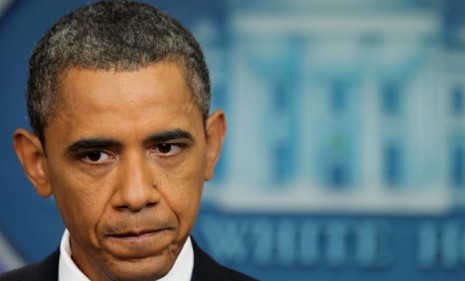Should Obama abandon his 'go-big' debt ceiling strategy?
Despite faltering talks with the GOP, the president remains steadfast that the House should seek to reach the "largest possible deal" in resolving the budget crisis

The "grand bargain" between Democrats and Republicans fizzled over the weekend after House Speaker John Boehner (R-OH) rejected President Obama's proposal for more tax increases in exchange for cuts in Social Security and Medicare spending. That means the House is no closer to reaching an agreement that would raise the debt ceiling, saving the country from defaulting on its loans. In a press conference Monday morning, Obama insisted that he wouldn't sign any short-term deal to raise the debt limit, saying he would only approve "the largest possible deal" — consistent with his position that Congress should use the debt talks as an opportunity to pass sweeping budget legislation. With the Aug. 2 deadline to raise the debt ceiling looming dangerously close, is it time that Obama cave a bit on his "go-big" aspirations?
The strategy never had a chance: Obama's "go-big" strategy was always a long shot, says Jena McGregor at The Washington Post. "Going for the 'big' when there's been almost no 'small' is not the way most compromises get made." A breakthrough the size of which Obama proposed only happens after a series of smaller deals that "build trust, bridge alliances, and create a foundation of confidence" between two parties. With Democrats and Republicans "further apart" on these issues than they've been in recent memory, the "building blocks of grand compromises" are missing.
"The problem with Obama's 'go-big' debt ceiling strategy"
The Week
Escape your echo chamber. Get the facts behind the news, plus analysis from multiple perspectives.

Sign up for The Week's Free Newsletters
From our morning news briefing to a weekly Good News Newsletter, get the best of The Week delivered directly to your inbox.
From our morning news briefing to a weekly Good News Newsletter, get the best of The Week delivered directly to your inbox.
A less ambitious plan would be more likely to pass: Rather than keep pushing a big bipartisan proposal that Republicans won't accept, Obama should be peddling a "medium-sized bipartisan deal" that would be more palatable to both parties, says Yuval Levin at National Review. Instead of fruitlessly pressuring the GOP to accept increased tax revenues, Obama should propose reducing defense and discretionary spending in exchange for mild, deficit-neutral tax reform. Really, the "lost opportunity for a big compromise" is actually a "gained opportunity for a real compromise."
But, for now, the strategy is good for Obama, politically: After publicly chiding the Republicans for their unwillingness to make concessions in debt talks, Obama's press conference "seemed more about pressing his tactical political advantage than furthering negotiations," says Adam Sorensen at TIME. Each time Obama speaks about how far he was willing to go to compromise on debt talks, he reminds voters that "he is the responsible and concerned steward" and that the Republicans are being "stubborn." Remaining steadfast on an "ambitious" deal may not be practical — the GOP clearly will not bend its position on tax increases — but it does leave Obama "in a politically favorable position."
"In debt press conference, Obama enjoys the upper-hand"
A free daily email with the biggest news stories of the day – and the best features from TheWeek.com
-
 Is Alex Pretti shooting a turning point for Trump?
Is Alex Pretti shooting a turning point for Trump?Today’s Big Question Death of nurse at the hands of Ice officers could be ‘crucial’ moment for America
-
 The best dark romance books to gingerly embrace right now
The best dark romance books to gingerly embrace right nowThe Week Recommends Steamy romances with a dark twist are gaining popularity with readers
-
 The ocean is getting more acidic — and harming sharks’ teeth
The ocean is getting more acidic — and harming sharks’ teethUnder the Radar ‘There is a corrosion effect on sharks’ teeth,’ a study’s author said
-
 The billionaires’ wealth tax: a catastrophe for California?
The billionaires’ wealth tax: a catastrophe for California?Talking Point Peter Thiel and Larry Page preparing to change state residency
-
 Bari Weiss’ ‘60 Minutes’ scandal is about more than one report
Bari Weiss’ ‘60 Minutes’ scandal is about more than one reportIN THE SPOTLIGHT By blocking an approved segment on a controversial prison holding US deportees in El Salvador, the editor-in-chief of CBS News has become the main story
-
 Has Zohran Mamdani shown the Democrats how to win again?
Has Zohran Mamdani shown the Democrats how to win again?Today’s Big Question New York City mayoral election touted as victory for left-wing populists but moderate centrist wins elsewhere present more complex path for Democratic Party
-
 Millions turn out for anti-Trump ‘No Kings’ rallies
Millions turn out for anti-Trump ‘No Kings’ ralliesSpeed Read An estimated 7 million people participated, 2 million more than at the first ‘No Kings’ protest in June
-
 Ghislaine Maxwell: angling for a Trump pardon
Ghislaine Maxwell: angling for a Trump pardonTalking Point Convicted sex trafficker's testimony could shed new light on president's links to Jeffrey Epstein
-
 The last words and final moments of 40 presidents
The last words and final moments of 40 presidentsThe Explainer Some are eloquent quotes worthy of the holders of the highest office in the nation, and others... aren't
-
 The JFK files: the truth at last?
The JFK files: the truth at last?In The Spotlight More than 64,000 previously classified documents relating the 1963 assassination of John F. Kennedy have been released by the Trump administration
-
 'Seriously, not literally': how should the world take Donald Trump?
'Seriously, not literally': how should the world take Donald Trump?Today's big question White House rhetoric and reality look likely to become increasingly blurred